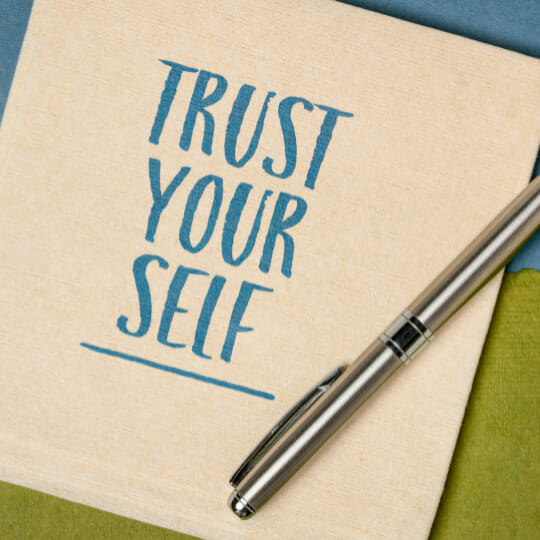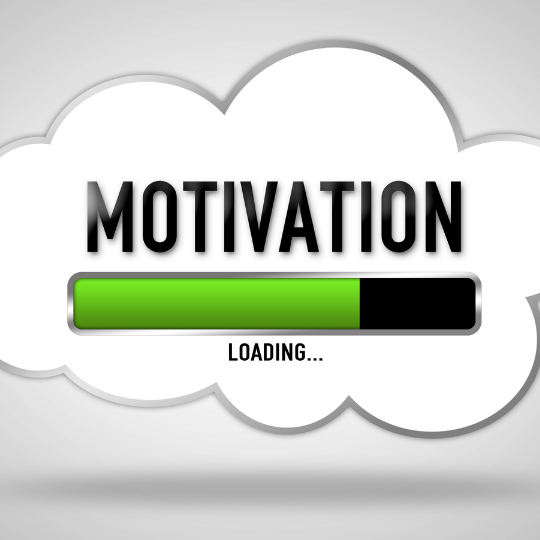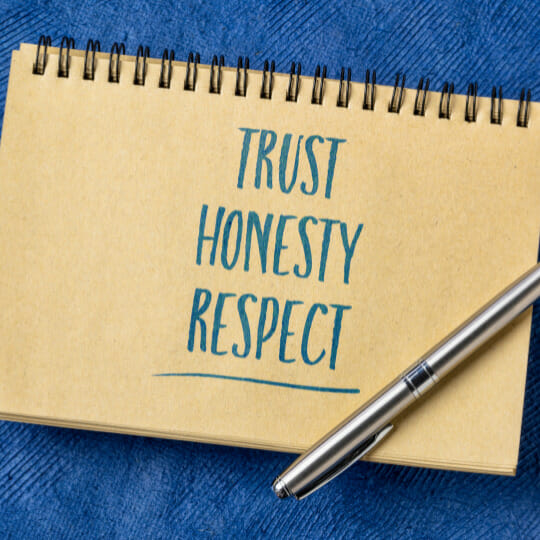
Trusting yourself as a key to developing self belief – and in creating a thriving business.
That’s because if you can’t follow through on your commitments, you will lack self-belief and self-confidence, and you will also be seen as unreliable or flaky by others.
How can you learn to trust yourself more and build more self belief, so that you can show up confidently and achieve what you want in the world?
That’s what I want to discuss today.
I want to start by providing some backstory to this and outlining some basics on how the brain works and how self-trust can be formed or eroded.
Firstly, you will only believe something is true if your brain has enough evidence to prove it.
For example, if you have previously run and won (or come close to winning) a 5K race, then you probably trust that you can probably win a 5K race in future.
Here’s another example.
Let’s say you have previously gotten up at 7 a.m. each day and created a daily work plan and then completed all of the tasks in your plan. You didn’t need anyone telling you to do it; you were self-motivated and just got it done.
Because you’ve had that experience, you trust that you can do it again.
Where I’m heading with this is that if you’re willing and able to be accountable to yourself, and do the things you set out to do, at least for a little while, then you will start to build self trust.
But if you consistently start things and give up right away, or focus on what you haven’t followed through on, then your brain will notice the unfulfilled promises and tell you that you’re only capable of making empty promises and that you’re not to be trusted.
For example, if you keep meaning to walk each weekday after work but it doesn’t happen, maybe you never even start, and then you will start doubting your ability to do things.
Or maybe, you just can’t be bothered!
Let’s talk about these two important pieces – self-accountability, and motivation – because they are so important for anybody who wants to achieve anything in the world.

Have you ever wondered why it can be so hard to be self-accountable?
The first reason is that when you always put other things and other people first, you often end up doing that at your own expense, and therefore letting yourself down.
Or, if you have too much on your plate and so you constantly struggle to get everything done, you are also letting yourself down.
In either scenario – putting yourself last, or having unrealistic expectations – you are eroding trust in your ability to start, persist or complete something.
Let’s project this outward for a moment and see how it feels to be on the receiving end.
Imagine that you were working with somebody who constantly let you down.
They would promise that they would do certain things by a certain time, or that they would have that report finished by Friday, yet they never ever met those deadlines.
How do you feel about that person? Would you trust them? Would you be relying on them for things? Would you believe in their capacity to do things?
When you don’t meet your own goals and expectations, you end up feeling that way about yourself, and also, you become known as someone who is unreliable or flaky – which erodes trust from your client base!
There are three things to think about here.
Firstly, what looks like a lack of motivation is often a lack of energy.
That’s why people who are overloaded may find it hard to make decisions, feel overwhelmed and exhausted at the thought of doing anything new or finding the mental energy to be consistent with habits.
Secondly, motivation may come after you have made a commitment to something.
Thirdly, motivation may come only when you know what to do and/or have taken the first steps.

So, if you have avoided making decisions or if you haven’t mapped a clear plan or pathway, you might get stuck in an avoidance pattern where you don’t take any action because you aren’t committed or clear on what to do.
With all that said and done, hopefully you’re clear on why you might not trust yourself.
But if you want to flip this around and start trusting yourself, you need to stop doing those things and change your behaviour.
Here are three things that can help you to build trust.
(1.) Honesty
Firstly, be honest with yourself. If you want to be consistent with something but you don’t have the energy, time or commitment, be clear on that and park the idea.
Schedule a date to revisit it when you think you might have some more breathing space.
Secondly, be honest with others.
Honesty also extends to your responsibilities at work and in your relationships. If you don’t have the capacity to do something or the bandwidth to contribute, say so.
Don’t burn yourself out for the sake of someone else’s happiness.

Don’t put yourself last and expect to muddle through it. It won’t work.
By being honest with yourself and others, you will be able to set boundaries that give you time, space and capacity to actually do things for yourself.
Then you will be able to do those things, stick with them, and build trust.
(2.) Decide what you will commit to
One afternoon when I was 14 years old, my best friend’s mother came into their kitchen and hung a rubber disc on the wall. It was the size of a dinner plate and it had writing on it.
“What IS that?” we said.
‘It’s a round tuit.” she replied. Sure enough, the disc had those words on it.
She said, “It’s a fun little reminder of all the things that I keep saying I will get around to doing one day.”
We all have things that we’d like to get around to doing one day, but as long as those things are hovering around in your brain without any action, there is a clear lack of commitment, importance and/or energy.
If you have a list of ‘round tuits’, I suggest you write them all down and look at the list with honest eyes and make some decisions.
Decide what you’ll never do and cross it off the list.
Decide which ones have merit and evaluate them. Visualise yourself actually doing them, and then, cross off any that aren’t important, realistic or likely.
Decide which ones you will do at some point, and diarise time slots to revisit each one and make a project plan.
When you have done this, your round-tunes will become actionable projects that you feel honestly committed to.
One last thing on this. We all have to do things that we don’t like doing or find difficult, like writing a blog or exercising.
But we may need to do those things in order to succeed, so we can choose to make those things more enjoyable somehow, focus on the outcome we’ll get, or find ways to make those tasks a bit easier.
When you are committed to doing something, this part is much easier!
Rather than doing something ‘when you feel like it’, you will have a non-negotiable, automatic habit that you do no matter what.
(3.) Set specific goals and build in self-accountability.
Once you have done the first two steps, you can create specific, tangible goals that are based on clearly defined, realistic actions with their own unique days and time slots.
Be clear to identify whether you need training or support to take each action.
Make sure your confidence in achieving each one is at least a 9/10.
Troubleshoot in advance – plan away the roadblocks and create cues and support to help you succeed, like reminders to complete a plan, or developing a checklist you can use to complete the steps.
This is the secret to setting and actually achieving all of your goals, and building self-trust through self-accountability.
When you start doing this, you will start to feel good about yourself, and the outside world will see and feel it, too.
If you can’t follow through on your commitments to yourself, you will lack self-belief and self-confidence, and you will also be seen as unreliable or flaky by others.
That feels terrible.
It can be hard to commit to yourself if you normally put yourself last, overcommit, or otherwise lack motivation.
Luckily, you can change ALL of these things, by
The more you commit to and achieve your own objectives, the greater trust you will have in yourself, the more confident you will feel, and the more self-belief you will have.
Understanding who you are and what you need will allow your business to thrive! If you’re truly ready to break old habits and get out of the rut I encourage you to check out the Habitology membership.
Learn more here: